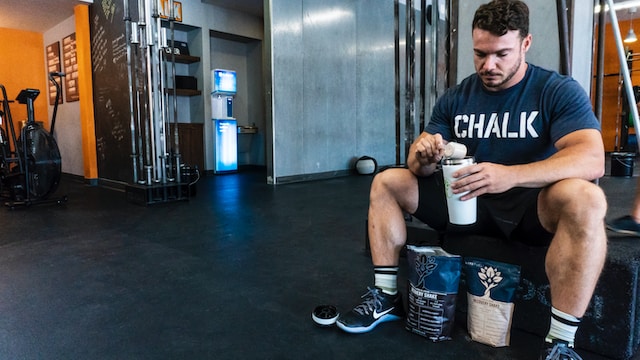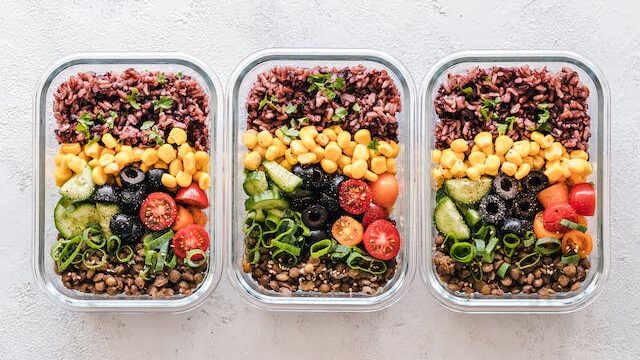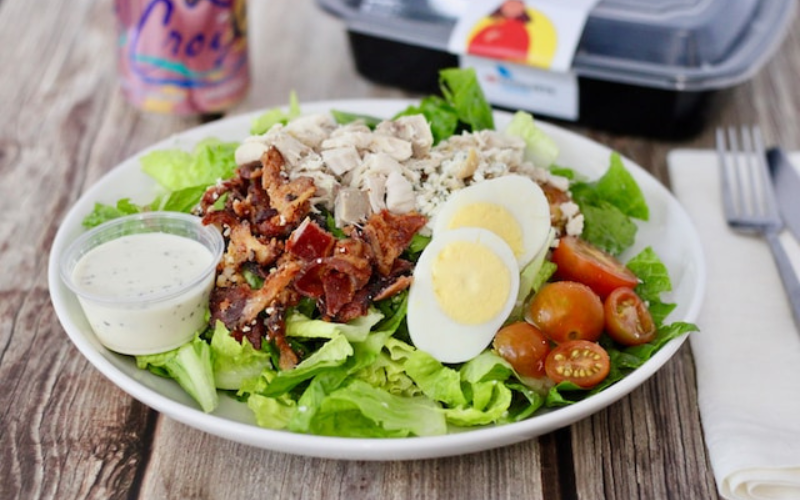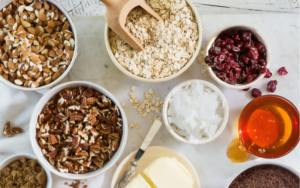Protein is super important for our bodies, especially if you’re someone who’s really active or trying to build muscle. For some, getting as much as 170 grams of protein every day is a goal. Let’s explore how you can do that.
Table of Contents
Key Takeaways:
- Protein is crucial for health and muscle building.
- There are lots of foods that are high in protein.
- Planning your meals can help you reach 170 grams of protein a day.
- It’s important to balance high protein with other nutrients.
The Significance of Protein in Nutrition
Protein is a key part of what makes our bodies work well. It helps build muscles, repair tissues, and even makes enzymes and hormones.
Athletes, bodybuilders, or people who do a lot of heavy workouts might aim for 170 grams of protein each day to help their muscles recover and grow.

Understanding Protein and Its Functions
What is Protein?
Protein is made of building blocks called amino acids. It’s found in every cell of our body and is essential for health and growth.
Protein’s Role in the Body
Protein does a lot! It helps build muscles, repairs tissues, makes hormones and enzymes, and can be an energy source too.
Strategies to Reach 170 Grams of Protein Daily
Planning Your Protein Intake
To eat 170 grams of protein a day, planning is key. You’ll need to think about including protein in every meal.|
While getting enough protein is important, you also need to eat other nutrients like carbs and fats for a balanced diet.
Key High-Protein Foods for Your Diet
Here are some foods that are packed with protein:
- Chicken breast
- Turkey
- Lean beef
- Fish like salmon and tuna
- Eggs
- Dairy products like milk and yogurt
- Legumes like beans and lentils
- Nuts and seeds
Protein Powder Shakes can also be a great way to increase you protein intake.
Nutritional Benefits
These foods are not just high in protein, but also offer other good stuff like vitamins, minerals, and healthy fats.
| Food | Protein (per 100g) |
|---|---|
| Chicken | 31g |
| Beef | 26g |
| Salmon | 25g |
| Eggs | 13g per egg |
| Milk | 3.4g per 100ml |
Crafting Meal Plans for 170 Grams of Protein
First Plan
Let’s break down the first meal plan to get to that 170-gram protein target;
- Breakfast: Scrambled Eggs with Spinach
- Ingredients: 3 large eggs (18g of protein), 1 cup of spinach (5g protein), 1 slice of whole-grain bread (4g protein)
- Preparation: Scramble the eggs and cook the spinach on the side. Serve with whole-grain toast.
- Total Protein: Approximately 27g
- Mid-Morning Snack: Greek Yogurt with Almonds
- Ingredients: 1 cup of Greek yogurt (20g protein), 1/4 cup of almonds (5g protein)
- Preparation: Mix almonds with Greek yogurt.
- Total Protein: Approximately 25g
- Lunch: Grilled Chicken Salad
- Ingredients: 150g grilled chicken breast (45g protein), mixed greens, cherry tomatoes, cucumber, 1 tablespoon olive oil dressing
- Preparation: Grill the chicken breast and slice it. Toss it in a salad with fresh veggies.
- Total Protein: Approximately 45g
- Afternoon Snack: Protein Shake
- Ingredients: 1 scoop of protein powder (varies, but approximately 25g protein), water or almond milk
- Preparation: Blend the protein powder with water or almond milk.
- Total Protein: Approximately 25g
- Dinner: Grilled Salmon with Vegetables
- Ingredients: 200g salmon fillet (50g protein), asparagus, bell peppers, 1 tablespoon of olive oil
- Preparation: Grill the salmon and sauté the vegetables with olive oil.
- Total Protein: Approximately 50g
- Evening Snack: Cottage Cheese with Berries
- Ingredients: 1 cup of cottage cheese (28g protein), 1/2 cup of berries
- Preparation: Serve the cottage cheese with a side of fresh berries.
- Total Protein: Approximately 28g
| Meal | Main Protein Source | Protein (g) |
|---|---|---|
| Breakfast | Eggs & Spinach | 27g |
| Mid-Morning | Greek Yogurt | 25g |
| Lunch | Chicken | 45g |
| Afternoon | Protein Shake | 25g |
| Dinner | Salmon | 50g |
| Evening | Cottage Cheese | 28g |
| Total Protein | 200g |
Prepare in Bulk: One of the best ways to consistently hit your protein goals is by preparing meals in bulk. This means cooking larger quantities of protein-rich foods at once and storing them for use throughout the week.

Second Plan
- Breakfast: Protein Pancakes
- Ingredients: Protein pancake mix (20g of protein per serving), 1/2 cup Greek yogurt (10g protein) as topping
- Preparation: Prepare the pancakes as per the mix instructions. Top with Greek yogurt.
- Total Protein: Approximately 30g
- Mid-Morning Snack: Tuna Salad
- Ingredients: 1 can of tuna (in water) (25g protein), mixed with lettuce and light mayo
- Preparation: Mix tuna with a little mayo and serve on a bed of lettuce.
- Total Protein: Approximately 25g
- Lunch: Beef Stir-Fry
- Ingredients: 150g lean beef strips (40g protein), mixed vegetables (broccoli, bell pepper), soy sauce
for flavor - Preparation: Stir-fry the beef and vegetables in a pan, add soy sauce for flavor.
- Total Protein: Approximately 40g
- Ingredients: 150g lean beef strips (40g protein), mixed vegetables (broccoli, bell pepper), soy sauce
- Afternoon Snack: Protein Bar
- Ingredients: 1 high-protein bar (varies, but approximately 20g protein)
- Total Protein: Approximately 20g
- Dinner: Pork Chop with Quinoa
- Ingredients: 200g pork chop (50g protein), 1 cup cooked quinoa (8g protein)
- Preparation: Grill or bake the pork chop. Serve with cooked quinoa.
- Total Protein: Approximately 58g
- Evening Snack: Hard-Boiled Eggs
- Ingredients: 2 large hard-boiled eggs (12g protein)
- Preparation: Boil eggs and peel them for a quick snack.
- Total Protein: Approximately 12g
| Meal | Main Protein Source | Protein (g) |
|---|---|---|
| Breakfast | Protein Pancakes | 30g |
| Mid-Morning | Tuna Salad | 25g |
| Lunch | Beef Stir-Fry | 40g |
| Afternoon | Protein Bar | 20g |
| Dinner | Pork Chop & Quinoa | 58g |
| Evening | Hard-Boiled Eggs | 12g |
| Total Protein | 185g |
Navigating High-Protein Diet Challenges
Common Difficulties in High Protein Intake
- Feeling Full: High-protein foods can be very filling, making it hard to eat enough.
- Limited Variety: Relying on the same protein sources can become monotonous.
- Cost: High-quality protein sources can be expensive.
Solutions
- Space Out Meals: Eating smaller, more frequent meals can help manage fullness.
- Explore Different Foods: Try various protein sources to keep meals interesting.
- Budget-Friendly Options: Incorporate more cost-effective proteins like beans, lentils, and canned tuna.
FAQs on High Protein Diets
- Can vegetarians achieve 170 grams of protein a day?
Yes, through a combination of plant-based proteins like lentils, beans, tofu, and plant-based protein powders.
- Will eating 170 grams of protein help me build muscle faster?
While protein is essential for muscle growth, consuming more than your body can use doesn’t necessarily speed up muscle growth.
- Are there any side effects of eating so much protein?
Possible side effects include digestive issues, kidney strain, and dehydration. It’s important to balance protein with other nutrients and stay hydrated.
- How can I track my daily protein intake?
Using a food diary app or keeping a food journal can help you track your protein intake.



